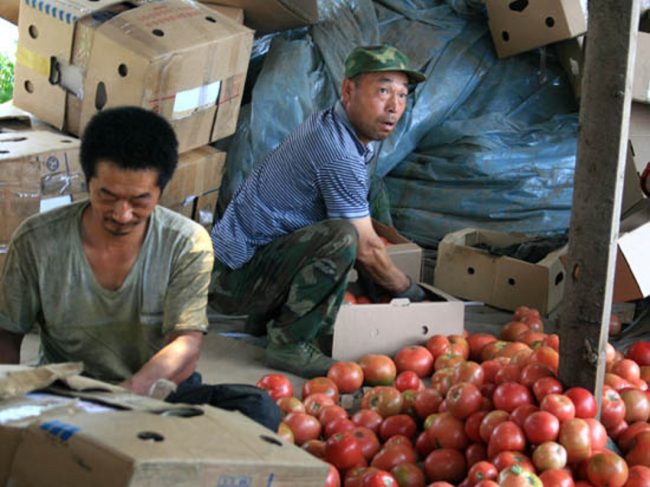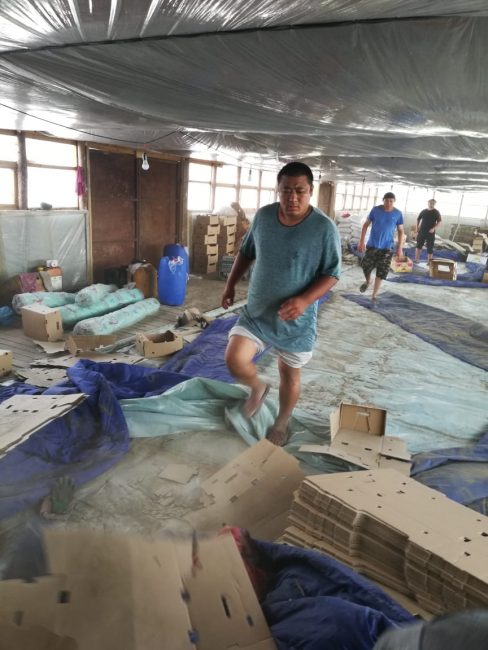A land dispute in Daghestan’s Nogay District has caused a backlash against local Chinese migrant workers


 A dispute between an entrepreneur and greenhouse owner in Daghestan’s Nogay district and residents of the village of Nariman took on an ethnic component after a video allegedly of Chinese workers cooking a dog alive went viral on social media. But some from the district have questioned whether this is the true cause of the conflict.
A dispute between an entrepreneur and greenhouse owner in Daghestan’s Nogay district and residents of the village of Nariman took on an ethnic component after a video allegedly of Chinese workers cooking a dog alive went viral on social media. But some from the district have questioned whether this is the true cause of the conflict.
The conflict began after a video went viral in Daghestani social networks in which a group of people, allegedly Chinese residents of Daghestan’s northern Nogay District, appear to cook a dog alive in a cauldron. The caption to the video said that it was recorded in the capital of Nogay District, Terekli-Mekteb. The video caused outcry in the nearby village of Nariman, where Chinese migrant workers have been working for five years in greenhouses, cultivating tomatoes.
On 18 July, the issue of the greenhouses in the vicinity of the village was raised at a Nariman village meeting.
‘A contradiction of the culture of the Nogay people’
The head of Nariman, Zamir Suyundikov, lamented during the meeting that the greenhouses were not bringing any revenue into the village budget, despite half of them being located on the village’s territory. The other half are located on land belonging to a district forestry farm, owned by Nogay Forestry.
Member of the District Assembly Abdul-Kapar Adiyev pointed out that the lands belonging to the forestry farm were not being used for their original purpose — cultivating tree seedlings.
The owner of the greenhouses and the head of Nogay Forestry were reportedly invited to the meeting, but failed to show up.
Several local residents at the meeting demanded the greenhouses be shut down, arguing that the ‘culture of the Chinese workers’, in particular their ‘national cuisine’, ‘contradicted the culture of the Nogay people’. They also demanded the workers be expelled in order to avoid ‘negative consequences’.
In addition to Chinese people, the greenhouses also employ workers from Uzbekistan as well as local residents of Nogay District.

Several people present at the meeting told OC Media that residents of Nariman argued that the owner of the greenhouses signed a contract with the municipality to lease the land for just five years, which expired this summer.
They said another reason for the conflict was ‘Chinese methods’ being employed to cultivate tomatoes using fertilisers. Ismail Cherkesov, a well-known public figure in Nogay District, told OC Media that local residents didn’t trust the quality of the agricultural produce.
‘Our own people work in these greenhouses and they see that unknown Chinese fertilisers are being used. They say that something must be wrong with the produce, as, for example, one day tomatoes are green, and then suddenly, after being sprayed with something, they turn red the next day and are ready to be shipped. It’s not like that with usual vegetables and berries, that’s why they’re scared. They doubt it’s harmless’, Cherkesov said.
Cherkesov said the villagers’ fears are also caused by the possibility that the fertilisers are contaminating the local soil. According to him, locals claim that the fertilisers make the soil barren, and that they are closely following news about the environmental impact of Chinese greenhouses in other regions of Russia.
Local residents have also appealed to the Prosecutor of Daghestan, Denis Popov, with a request to investigate the legality of the greenhouse business.
‘Vested interests’
The reaction to the scandal was immediate. On 19 July, the day after the village meeting, a working commission headed by Khadis Saadolazimov, head of the Department of State Federal Forestry Oversight of Daghestan’s Forestry Committee arrived to the Nogay District.
The commission inspected the premises of the forestry farm, including the greenhouses. Residents of Nariman came to the scene, complaining about trees being logged for the greenhouse business. According to them , this was done by foreign workers.
The villagers also told the commission that the greenhouses were using land without any permits or lease.
Following the inspection, the commission held a briefing in Terekli-Mekteb, following which a statement about was published on 30 July. According to the statement, 15 hectares of land belonging to Nogay Forestry had been used illegally by individual entrepreneur Kalimat Mengliyazova since 2015.
‘Under the terms of the lease agreement, the lessee is obliged to use the forest plot strictly for the intended purpose, to prepare a development plan for the forest plot, and submit it to the Committee for examination. However, not having the relevant documents, lessee K R Mengliyazova began to develop the forest area in 2015’, the Committee’s statement reads.
Commission head Khadis Saadolazimov told OC Media that the site which residents of Nariman refer to as a tree nursery did have this status in the past, but this was no longer the case. When asked about the logging, Saadolazimov said the stumps villagers had shown him did not appear to be recently cut, seeming to have been from around two years ago.
Based on the results of the inspection, the Forestry Committee ordered Mengliyazova to stop using the area until ‘the full package of permits’ is processed.
‘They can understand’
Residents of Nogay District have tried to find a solution to the problem locally. According to local public figures, a compromise between Nariman villagers and entrepreneur Kalimat Mengliyazova was eventually reached.
Rustam Adilgereyev a farmer and public figure in Nogay District, told OC Media that the parties agreed that the greenhouses will stay until November, to allow this year’s harvest to be collected, after which the greenhouses would be removed.
‘The representatives of the greenhouse entreprise explained to the people of Nariman that they had already planted seeds for the autumn harvest and asked them to wait until November when the harvest can be collected. Many of our people work in agriculture, they understand the amount of labour and investment. They can understand, they’re not barbarians’, Adilgereyev said.
According to him, the Mengliyazova pledged to invest in improvements in the village of Nariman. Asked about the consequences of the conflict, Adilgereyev noted that the incident had a negative effect on the prestige of the Nogay District.
‘We see that the Chinese are sought after in other regions, like in Chechnya. I look at this problem not only as a farm businessman, but also as an economist, which I am by education. Foreigners and their technologies are investments into the development of the local economy and we should involve them, not scare them off’, Adilgereyev said.
[Read about the controversies surrounding Chinese farmers in Chechnya on OC Media]
Adilgereyev also noted that the the effect of the Chinese chemicals on local soil should be evaluated by the authorities, and not by the fears of local residents. ‘Everybody has been talking about it for a long time, but no one has figured out yet whether it’s true’, Adilgereyev said.
According to Adilgereyev, farmers in the Nogay District should learn how to cultivate crops in greenhouses themselves and embrace new technologies, including Chinese ones, and ‘to win with them in open competition, not the other way around as it is now’.
According to one businessman in the Nogay District, the conflict is related not only to ecological, ethnic, and economic issues, but also to the local political situation. They told OC Media that Mengliyazova has close ties with the unpopular former head of the Nogay District, Kazmagomed Yanbulatov, who was in power when she obtained the lease from Nogay Forestry. Villagers in Nariman openly opposed the local authorities at the time.
After Yanbulatov’s resignation in the summer of 2017 and the subsequent political crisis, the influence of people close to him declined. According to the businessman, the démarche of the Nariman villagers against the greenhouse business is an echo of their struggle with the former local authorities.
In spite of Kalimat Mengliyazova and the villagers having reached an agreement, the land dispute is set to continue — between the Forestry Committee and Nariman’s village council.








